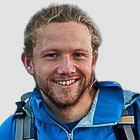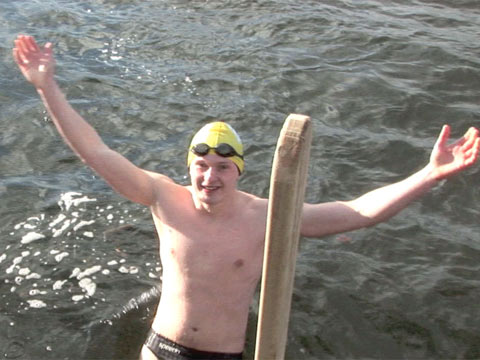A pair of waterfalls tumble out of a sinuous, rocky cataract into a deep, blue-green pool with a magnificent ash tree curling out above it, the leaves on one of its broad boughs almost touching the surface. The water in the pool ripples and sparkles in the late June sunshine, and a couple of brown trout dart away out of sight. A “beach” of smooth, jade-coloured rocks, polished like gemstones, slips into the water.
We have only been walking for about 45 minutes, but the lure of a dip in Tongue Pot is irresistible. I jump off a craggy ledge and feel a delicious rush of cold clarity as I plunge in. My brother-in-law Chris leaps off a much higher spot, maybe five metres high. I walk up to the same ledge and take a look down. The water seems laughably far away and I decide I’m happy to skip this particular test of bravery. We dry off, hoist our backpacks again and continue our climb into the fells.
We are at the start of an effort to lasso together the fells known as the Eskdale Horseshoe, surrounding upper Eskdale. Taking in England’s highest mountain, Scafell Pike, along with several others, over a 14-mile hike with about 1,800 metres of ascent, it is a spectacular but formidable route, and our plan is to complete it over two days, split by a wild camp high in the fells.
There’s an important caveat to be made here: wild camping – in the form of discreet one-night stays in the hills and mountains at some distance away from civilisation – is traditionally tolerated in the Lake District, provided it is done responsibly. The National Trust acknowledges that “there’s a long tradition of wild camping in the Lake District”, but in response to the surge in people wanting to camp there and some of the problems that has brought, emphasises that your campsite should always be above the highest wall boundary on the mountain (usually about 400 metres), should not involve more than two tents in the same spot, should not involve fires or barbecues, and should always “leave no trace” of litter or waste.
Carrying a large pack on a muggy summer day is hot, heavy work, but it’s made considerably easier if you can regularly cool off. As well as mountain drama, I’ve chosen our particular take on the horseshoe for aquatic appeal, which is found in abundance around here in the form of waterfalls, plunge pools and tarns, rather than big lakes. Wild walking, wild sleeping and wild swimming – could there be a more wholesomely satisfying combination?
After leaving Tongue Pot, one of the better-known highlights of the upper River Esk, we carry on up the moodily dramatic gorge. The Esk is fed by streams that rise from the highest ground in England, and tumbles into the Irish Sea near Ravenglass just 15 miles later. The erosive power of that fast-flowing water has carved a host of cataracts, canyons and plunge pools from the volcanic rock, and as we walk, we pass several more superb spots for a splash. Even if the best-known places are busy, finding our own little enclave in the smoothly sculpted, serpentine gorge isn’t difficult.
We emerge into the highest part of upper Eskdale, a spectacular mountain sanctuary surrounded by giants: Scafell Pike and other big-hitters such as Bowfell and Crinkle Crags, enclose this hanging valley. It’s also rugged, remote and lacking in any obvious tourist “draws”, so the crowds have never found their way here, and development is nonexistent (the Friends of the Lake District saw off a proposed hydroelectric scheme in the 1940s).
Although actual wildlife is a bit thin on the ground – the hungry Herdwick sheep, with their propensity for devouring vegetation, see to that – it certainly feels wild, a long way from the bustle of Bowness or Grasmere. We walk across the expanse of Great Moss, which gives a spectacular view of the south side of the Scafell massif: a craggy, complex mass of bulging ridges and blank walls of rock.
We make the scrambly climb up a gully via Foxes Tarn to the summit of Scafell, the second-highest mountain in England. At 964m, it is just 13 metres lower than its sibling, but with the exception of a croaking raven, we were alone on its summit. By contrast, about 40 people were milling around Scafell Pike’s crowning cairn, just a few hundred metres away across the col of Mickledore. The air was still enough for us to hear snippets of their conversation.
Our wild camping spot was near a well-known upland tarn, embedded like a jewel below Great End, with shelves of rock sloping temptingly into its green depths. Before we set up our tents I took a brief, bracing dip, the water distinctly nippier at this higher altitude. Chris went in up to his waist, uttered an oath and demurred.
The cloud lowered soon afterwards to encase us in claggy mire. But on the climb up to Esk Pike the next morning, the world gradually started brightening, and we found ourselves emerging back into the sun above a sea of cloud, with the clear mountain summits of Great Gable and the distant Langdale Pikes protruding above it like volcanic islands. Moments like this crystallise the appeal of wild camping up high: being able to experience the mercurial, shapeshifting magic of mountainous places at dusk or dawn in all their glory.
As we walked over Esk Pike, Bow Fell and Crinkle Crags, the cloudscape thickened, but occasionally peeled apart, revealing contrasting views: the cosy patchwork of Langdale on one side, and the stark emptiness of upper Eskdale on the other. Sun the colour of wild honey trickled across the landscape.
There are few better feelings after the grime of a wild camp than plunging into the icy freshness of a mountain river, and after descending back into upper Eskdale, we found another exquisitely framed plunge pool in a tributary of the Esk where we could do just that.
Dragonflies danced across the water, Bow Fell looked down on us from the head of the valley, and a nearby ledge acted as a natural diving board. There are nameless gems like this all across the Lake District: make the effort to get off the beaten track, even just a little, and they can be yours alone for a precious hour or two.











